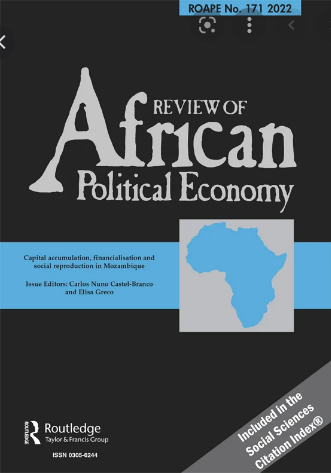The historical logic of the mode of capital accumulation in Mozambique

Title: The historical logic of the mode of capital accumulation in Mozambique
Author(s): Carlos Nuno Castel-Branco
Publication Date: March 2, 2022
Publisher: Review of African Political Economy (a member of the Taylor & Francis Publishers)
Quotation: Castel-Branco, Carlos Nuno. 2022. “The historical logic of the Mode of Capital Accumulation in Mozambique”. Review of African Political Economy, VOL. 49, NO. 171, 11–45 https://doi.org/10.1080/03056244.2022.2040225
Abstract: https://www.repository.utl.pt/handle/10400.5/23908 This article critically analyses the political economy dynamics and trajectory of the mode of capital accumulation in post-independence Mozambique, focusing on the capitalist restructuring that followed the adoption of the Washington Consensus from the late 1980s. The article highlights the main structural characteristics, dynamics and tensions in the economy, the relationships and conflicts that explain why they reproduce and expand, what makes them change and the nature of the crises that emerge. The historical logic of the mode of capital accumulation is explored focusing on the historically built and class-structured conditions of capital accumulation, highlighting linkagency, which is the dynamic relationship between agents and linkages. The historically specific traits of the mode of accumulation in Mozambique are derived from the structures of accumulation and class struggle conditions, both domestic and international. The argument is that the recent trajectory of the Mozambican economy was not inevitable, and that it can be logically understood and derived from the existing historical conditions of accumulation. Understanding this historical logic enables us to articulate socially transformative actions which are drawn from the objective and concrete analysis of the mode of accumulation and its contradictions, countering idealistic perspectives in political economy.
Identifier: https://doi.org/10.1080/03056244.2022.2040225
Category: Other Publications
This article by Carlos Nuno Castel-Branco investigates the historical logic of the mode of capital accumulation in Mozambique. By historical logic we mean the objective explanation of the specific characteristics based on an understanding of the country’s historical foundations, and the conflicts and tensions within and related to its structures of accumulation.
Abstract:
This article critically analyses the political economy dynamics and trajectory of the mode of capital accumulation in post-independence Mozambique, focusing on the capitalist restructuring that followed the adoption of the Washington Consensus from the late 1980s. The article highlights the main structural characteristics, dynamics and tensions in the economy, the relationships and conflicts that explain why they reproduce and expand, what makes them change and the nature of the crises that emerge. The argument is that the recent trajectory of the Mozambican economy was not inevitable, and that it can be logically understood and derived from the existing historical conditions of accumulation. Understanding this historical logic enables us to articulate socially transformative actions which are drawn from the objective and concrete analysis of the mode of accumulation and its contradictions, countering idealistic perspectives in political economy.
Quotation:
Castel-Branco, Carlos Nuno. 2022. “The historical logic of the Mode of Capital Accumulation in Mozambique”. Review of African Political Economy, VOL. 49, NO. 171, 11–45 https://doi.org/10.1080/03056244.2022.2040225
Access the article here.





